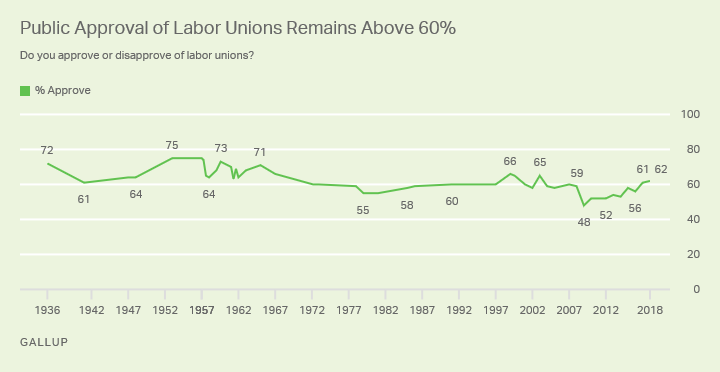DiSalvo -- Chapter 5 on Direct Democracy
Scott Walker
- Passes bill (DiSalvo 68-70)
- Survives Recall
- Loses on Tuesday

"I'm not satisfied when I see men like Jimmy Hoffa - in charge of the largest union in the United States - still free." -- JFK, first Kennedy-Nixon debate, 1960
Data on government employment
Top organizational contributors since 2002 (compare to DiSalvo, p. 58)
Eitan Hersh writes at FiveThirtyEight:
Most states — 44 out of 50 — hold some state and local elections off the federal cycle.
...
Why do Democrats and Democratic-aligned groups prefer off-cycle elections? When school boards and other municipal offices are up for election at odd times, few run-of-the-mill voters show up at the polls, but voters with a particular interest in these elections — like city workers themselves — show up in full force. The low-turnout election allows their policy goals to dominate.
Nurses as political champions
IMPORTANT DEVELOPMENT SINCE PUBLICATION OF THE BOOK:
Janus v. American Federation of State, County, and Municipal Employees, Council 31
DiSalvo:
The court’s decision will weaken but not destroy government unions. One study estimates that the state and local public sector union membership rate in collective bargaining states, 53.7 percent, will fall by 8.2 percentage points. The experience of states that have recently passed right-to-work laws suggests that some public unions may lose 10 percent to 30 percent of their memberships. Such declines imply losses of tens of millions of dollars in dues money. State and local government unions will come to resemble unions in the federal government, where agency fees are prohibited.
Major organizing efforts to stave off membership losses have been underway since 2014. Across the country, unions have been surveying their members to find out their priorities and asking employees to sign new union cards. Even with reduced memberships, public unions will remain potent forces in many states.
Nonetheless, taking public unions down a peg has another important effect: It will rebalance the playing field in states where the power of unions make it impossible for governments to address the rising costs of pensions and retiree health care, which are crowding out other spending. Oregon, for example, has $25 billion in unfunded pension liabilities, but the public employees’ union has adamantly opposed increasing members’ contributions.Elizabeth Bruenig:
Much can be said of the logic in the case. One might point out that, if money is speech and funding of government activities — broadly construed — by mandatory fees therefore signals a violation of free speech, there never has been free speech in the United States, thanks to taxes. But of course, money isn’t speech, and narrow transactions aren’t blanket endorsements, as anyone who has ever swapped cash for goods and services intuitively understands. Perhaps this is only evidence that, if you believe several small stupid things, you will eventually end up believing at least one incredibly large stupid thing.
Large organizations oriented toward any common good take this fact for granted: They require stable funding to operate toward their ends, and so long as they aren’t prohibiting constituents from personal expression or pursuit of private goods, contribution of one’s fair share is a reasonable expectation. Democracies in particular rely on this kind of reasoning. Labor unions, formed and run on stringently democratic principles to advocate broadly for the welfare of their members, certainly do as well.
But all of that’s principled, and principles are no defense against capitalists. Who funded Janus? Richard Uihlein, for one, a millionaire industrialist and Republican mega-donor with a history of getting what he wants out of government; the Koch brothers, of course; and a slew of other foundations funded by rich people who have enough money to purchase the laws that benefit them. The fact is that unions get in the way of maximal profits, because they protect workers’ interests by helping workers band together and bargain as a whole, instead of leaving them to fend for themselves alone, and that’s a problem for capital. But it’s one they’re solving, little by little.
No comments:
Post a Comment